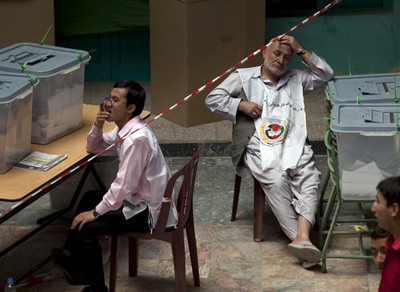Call it the mystery of the invisible voters. At one polling station in Nad-e-Ali, just over 400 people had voted by 1pm. Three hours later, the figure had apparently surged to some 1,200.
 Afghan election workers rest at a quiet polling station August 20, 2009 in Kabul, Afghanistan. (Photo: Getty Images)
Afghan election workers rest at a quiet polling station August 20, 2009 in Kabul, Afghanistan. (Photo: Getty Images)This despite the fact the streets were empty, all shops and businesses were shut and an Afghan army officer saying his men standing guard had hardly seen any civilians heading to these particular voting booths.
Casting further suspicion on the sudden leap, the number of voters at two more polling stations visited by The Independent remained stationary at one, and rose by 20 at the other.
Election officials were later seen counting piles of ballot papers, without even checking the choices, simply declaring the votes had been cast for incumbent president Hamid Karzai.
Nad-e-Ali, the most populous area of the volatile Helmand province, had become something of a litmus test for yesterday's poll.
A series of operations by British and Afghan government troops had retaken land from the Taliban with the aim of bringing the population into a security envelope so voters could actually get to the polls.
But despite this, the largest election monitoring group had refused to come to the district, deeming it still too dangerous. On the day there were rockets, machine-gun fire and mortar roads. Roadside bombs, deaths and injuries.
A six-year-old boy, called Muslim, and his 14-year-old cousin were brought into the medical centre at the Welsh Guards Battle Group headquarters after one round aimed at the British military base overshot and landed on a civilian house.
"The little boy had serious wounds and... there was nothing more we could do. It was very, very hard to take to see someone so young die," said Major Colin Wall, an Army doctor. "We sent the girl to the hospital in [the provincial capital] Lashkar Gar."
Officially, Nad-e-Ali district has around 50,000 registered voters, but only a fraction of them voted yesterday. Around 12,000 voters were automatically doomed to disenfranchisement because they lived in the pockets of the district that remain in Taliban hands.
And for the women among the remaining 38,000 voters, it was never going to be possible for them to exercise their voting rights in this deeply conservative society, because of a shortage of female election staff.
"We cannot even get the men to come here, so how could we get women? It was never going to happen," said one exasperated official.
A senior British official, Jim Haggerty, who made repeated checks of polling stations throughout the day, admitted there had been the occasional disappointment at isolated locations, but said that overall the day was a success. "This is a small but significant step in establishing governance in this part of Afghanistan," he said.



